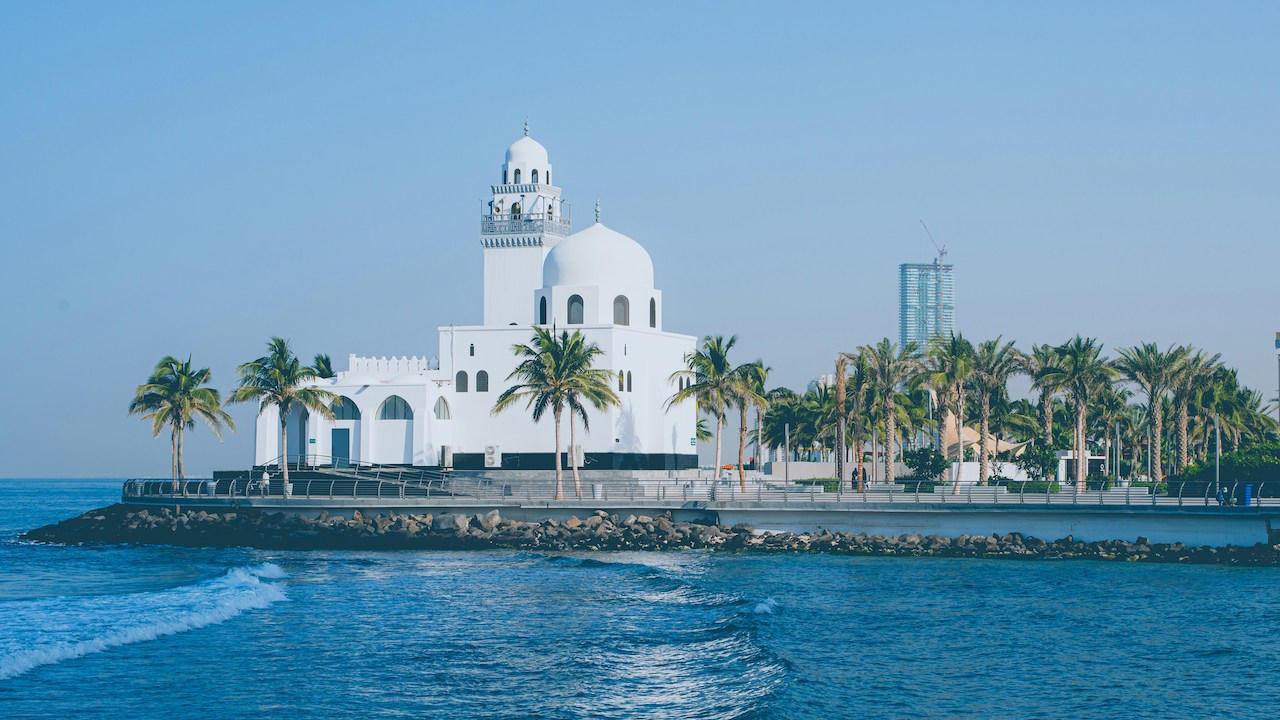Saudi Arabia continues to attract a significant number of Americans, with approximately 80,000 U.S. citizens residing in the Kingdom. Whether you’re considering a move or are already settled, understanding the nuances of life in Saudi Arabia is essential. From tax obligations to cultural norms, here’s what Americans living in Saudi Arabia need to know in 2025.
Snapshot of expat life in Saudi Arabia
- Primary tax forms: Form 1040, Form 2555
- Tax year: January 1 – December 31
- Tax deadline: April 15 (June 15 for expats)
- Currency: Saudi Riyal (SAR)
- Population: Approximately 36 million
- Number of Americans living in Saudi Arabia: Approximately 70,000-80,000
- Capital city: Riyadh
- Primary language: Arabic
- Tax treaty: No
- Totalization agreement: No
Americans living in Saudi Arabia: Visa types
For U.S. citizens seeking permanent residency in Saudi Arabia, the Kingdom offers several visa options under its Premium Residency Program. These visas provide the opportunity to live, work, and invest in Saudi Arabia without the need for a local sponsor. Below are the primary permanent residency visa types available:
Unlimited Duration Premium Residency
Who it’s for: Individuals seeking permanent residency in Saudi Arabia without time limitations.
Overview: This visa grants indefinite residency rights, allowing holders to live, work, and own property in the Kingdom without a local sponsor.
Requirements:
- Payment of a one-time fee of SAR 800,000 (~$213,000).
- Proof of financial stability.
- Clean criminal record.
- Medical clearance confirming the absence of contagious diseases.
Investor Residency
Who it’s for: Foreign investors aiming to contribute significantly to the Saudi economy.
Overview: Designed to attract substantial foreign investment, this visa allows investors to establish and operate businesses in Saudi Arabia.
Requirements:
- Minimum investment of SAR 7 million (~$1.87 million) within two years.
- Creation of at least 10 jobs for Saudi nationals within the first two years.
- Valid investment license from the Saudi Ministry of Investment.
- Proof of company ownership through valid documentation.
Entrepreneur Residency
Who it’s for: Startup founders and business innovators looking to launch ventures in Saudi Arabia.
Overview: This visa supports entrepreneurs in establishing and developing startups, contributing to various sectors in the Kingdom.
Requirements:
Tier 1:
- Minimum investment of SAR 400,000 (~$106,000) secured from accredited investors.
- Ownership of at least 20% of the company.
Tier 2:
- Minimum investment of SAR 15 million (~$4 million).
- Ownership of at least 10% of the startup.
- Creation of at least 20 jobs within two years.
Real Estate Owner Residency
Who it’s for: Individuals investing in the Saudi real estate market.
Overview: This visa is tailored for foreign nationals who own residential property in Saudi Arabia.
Requirements:
- Ownership of residential property valued at a minimum of SAR 4 million (~$1.07 million).
- Property must not be mortgaged or associated with real estate financing.
- Property must be developed and not undeveloped land.
By meeting the specific criteria for these visa types, U.S. citizens can secure permanent residency in Saudi Arabia, enabling them to fully engage in the Kingdom’s economic and cultural landscape.
How to apply for a Saudi Arabia permanent residency visa as a U.S. citizen
Applying for a permanent residency visa in Saudi Arabia as a U.S. citizen involves several clear steps. Here’s how the process typically works:
1. Choose your visa category
Select the visa type that fits your situation best (Unlimited Duration Premium Residency, Investor Residency, Entrepreneur Residency, or Real Estate Owner Residency).
2. Prepare required documents
Gather essential documents, which may include:
- Valid U.S. passport
- Proof of financial means or investment
- Clean criminal record certificate
- Medical clearance
- Relevant business or property ownership documents
3. Submit your application online
- Visit the official Saudi Premium Residency portal or the Ministry of Investment website.
- Complete the online application form for your chosen visa type.
4. Pay the application fee
Pay the applicable fee online (amount depends on the visa category).
5. Await application review
Authorities will review your submission and may request further information or clarification.
6. Receive your residency decision
- If approved, you’ll receive notification and instructions for finalizing your residency status.
- In some cases, you may need to visit a Saudi consulate or embassy to complete the process.
Following these steps will help you navigate the Saudi residency application smoothly and with confidence.
Healthcare options for Americans living in Saudi Arabia
If you’re an American living in Saudi Arabia, understanding how healthcare works can make a big difference to your overall experience abroad. Here’s what you need to know:
How the Saudi healthcare system works
Saudi Arabia has a well-developed healthcare system, largely funded by the government. Public hospitals, clinics, and medical centers offer services to Saudi citizens and residents. However, access for expats is different than for Saudi nationals:
- Public healthcare: Primarily serves Saudi citizens; some services may be available to residents with certain types of visas.
- Private healthcare: Widely used by expats, with modern facilities, English-speaking staff, and shorter wait times.
- Mandatory health insurance: Most expats are required to have private health insurance, often provided by their employer.
Healthcare options for Americans living in Saudi Arabia
As an American expat, your main healthcare options include:
- Employer-provided insurance: Many U.S. citizens working in Saudi Arabia receive private health insurance as part of their employment package. This typically covers treatment at private hospitals and clinics.
- Private health insurance: If you’re not covered by an employer, you’ll need to purchase a private plan. These plans vary in coverage and cost, so it’s important to review details carefully.
- Out-of-pocket payment: Some expats choose to pay for medical care directly, though this can become expensive for more serious issues.
- Pharmacies: Widely available, with many medications accessible over-the-counter—sometimes more readily than in the U.S.
Pros and cons to healthcare for American expats living in Saudi Arabia
Here are some key upsides and challenges to keep in mind:
Pros:
- High standard of care in private hospitals and clinics
- English is commonly spoken by medical staff in major cities
- Shorter wait times in private facilities compared to the U.S.
- Access to many medications without a prescription
Cons:
- Public hospitals may have limited access for expats
- Healthcare costs can be high without adequate insurance
- Cultural differences in patient care and communication styles
- Some treatments or medications available in the U.S. may not be offered locally
By understanding your options and planning ahead, you can ensure you and your family stay healthy and secure while living in Saudi Arabia.
Cost of living for American expats living in Saudi Arabia
Moving to Saudi Arabia can be a big shift, especially when it comes to everyday expenses. Let’s look at how the cost of living for American expats in Saudi Arabia compares to living in the U.S. This can help you set realistic expectations and plan your budget with confidence.
Here’s a quick side-by-side comparison of common monthly expenses (prices are approximate and will vary based on location, lifestyle, and current exchange rates):
| Expense | Saudi Arabia (Riyadh/Jeddah) | United States (Mid-size city) |
| Groceries | $350–$500 | $500–$700 |
| Housing (1 BR apt) | $500–$900 | $1,200–$2,000 |
| Transport (monthly) | $55–$90 (public), $2/gal gas | $70–$120 (public), $3.50/gal gas |
| Phone plan | $25–$40 | $45–$70 |
Please note: Prices are in U.S. dollars for easier comparison. Local costs may fluctuate due to exchange rates and city differences.
Pros to the cost of living in Saudi Arabia
- Affordable housing: Rents are generally lower than in many U.S. cities, especially outside of major compounds.
- Low transportation costs: Gasoline is much cheaper, and public transport is improving in major cities.
- No income tax: Saudi Arabia does not levy personal income tax on salaries, which can boost your take-home pay.
- Some essentials cost less: Groceries and utilities can be more affordable, depending on your preferences and lifestyle.
Cons to the cost of living in Saudi Arabia
- International school fees: If you have children, private/international school tuition can be very expensive.
- Imported goods: U.S. or Western brands and specialty foods often cost more than back home.
- Housing in expat compounds: These popular options for Americans can be significantly pricier than local apartments.
- Entertainment and social activities: Some leisure options may be limited or come at a premium compared to what you’re used to in the U.S.
We know adapting to a new financial landscape can be challenging, especially when everything from grocery shopping to finding the right phone plan feels different. By planning ahead and knowing where to expect changes in your budget, you’ll be better prepared to make the most of your experience abroad.
Where do American expats tend to live in Saudi Arabia?
While Americans can be found across the country, certain areas are especially popular for their amenities, international communities, and proximity to work opportunities:
- Riyadh: As the capital and business hub, Riyadh attracts many American professionals and their families. Popular expat neighborhoods include Al Olaya, Diplomatic Quarter, and compounds on the city’s outskirts.
- Jeddah: This coastal city is favored for its more relaxed vibe, access to the Red Sea, and well-established expat communities. Americans often live in compounds like Al Hamra or along the Corniche.
- Dhahran and the Eastern Province: Home to major oil companies and international schools, Dhahran and nearby cities like Khobar and Dammam draw many Americans working in the energy sector. Gated communities such as Aramco’s residential camp are well-known among expats.
- Yanbu: A smaller city on the Red Sea, Yanbu appeals to those working in the petrochemical industry and looking for a quieter lifestyle with access to beach activities.
Tax implications for Americans living in Saudi Arabia
Navigating taxes as an American living in Saudi Arabia can feel overwhelming, especially when you’re adapting to a new culture and financial system. We often hear questions like, “Do I still have to file U.S. taxes?” or “How does working in Saudi Arabia impact my IRS obligations?” Let’s break down what you need to know, so you can focus on enjoying your expat experience with fewer worries about tax surprises.
American expats’ tax obligations
As U.S. tax experts who work with expats every day, we know the unique challenges you face. Here’s what you need to keep in mind about your tax responsibilities while living in Saudi Arabia:
Filing U.S. tax returns
No matter where you live, if you’re a U.S. citizen or green card holder, you’re required to file a U.S. tax return every year if your income exceeds the IRS threshold. This is true even if you’re paid in Saudi riyals, your employer is a Saudi company, or you haven’t set foot in the U.S. in years. The IRS wants to know about your worldwide income, not just what you earn back home.
💡 Pro Tip:
Even if you owe nothing thanks to exclusions or credits, you still need to file. Missing returns can lead to penalties.
Saudi Arabian taxes
One of the perks of living in Saudi Arabia is that there is no personal income tax on employment income for individuals. This means your Saudi salary isn’t taxed locally—an appealing benefit for many expats. However, keep in mind:
- Other taxes, such as VAT (Value Added Tax), do exist and may affect your cost of living.
- If you have other types of income, such as business earnings or real estate profits, different rules may apply.
- Social insurance contributions (GOSI) may be required if you’re employed by a Saudi company, but these usually only apply to Saudi nationals.
Foreign Earned Income Exclusion (FEIE)
The IRS offers a powerful tool for Americans abroad: the Foreign Earned Income Exclusion. If you qualify (by meeting the Physical Presence or Bona Fide Residence Test), you can exclude up to a set amount of your foreign earned income ($120,000 for tax year 2023) from US federal tax.
- How to qualify: You must live outside the U.S. for at least 330 full days in a 12-month period, or be a bona fide resident of Saudi Arabia for an entire tax year.
- What’s excluded: Salary, wages, and professional fees earned in Saudi Arabia.
- What’s not: Income from U.S. sources or passive income like dividends, which is still taxed.
Foreign Tax Credit (FTC)
Because Saudi Arabia doesn’t tax your salary, most American expats here can’t claim the Foreign Tax Credit to offset U.S. taxes on employment income. However, if you do pay any Saudi taxes (on business, investments, or other non-employment income), you may be able to use the FTC to avoid double taxation.
Tax treaty
Currently, there is no active income tax treaty between the U.S. and Saudi Arabia. This means you can’t rely on a treaty to reduce your U.S. tax bill or clarify residency rules. Instead, you’ll use standard IRS exclusions and credits.
Reporting foreign bank accounts (FBAR and FATCA)
If you have bank or financial accounts in Saudi Arabia and their aggregate value exceeds $10,000 at any time during the year, you must file an FBAR (FinCEN Form 114). This is separate from your tax return and focuses on financial transparency.
- FATCA: You may also need to file IRS Form 8938 if your foreign assets are above certain thresholds.
- Why this matters: Penalties for missing these forms are steep, even if you don’t owe tax.
Social Security
Working for a U.S. company abroad? You may still be covered under U.S. Social Security, depending on your employment arrangement. If you work for a Saudi employer, you generally won’t pay into U.S. Social Security, and Saudi Arabia does not have a totalization agreement with the U.S.
- What this means: Time spent working in Saudi Arabia may not count toward your U.S. Social Security benefits, unless you maintain a U.S. employment connection.
- Planning tip: Consider your long-term retirement plans and how your expat years might affect your Social Security eligibility.
We get it—sorting out your taxes from halfway around the world isn’t easy. But with the right support, you can stay compliant, avoid costly mistakes, and enjoy the perks of expat life in Saudi Arabia with confidence. If you have specific questions about your situation, we’re here to help with clear, CPA-backed advice every step of the way. Ready to take the next step? Don’t let uncertainty hold you back. Reach out to our expert team to get personalized guidance and support—so you can move forward with confidence!
Frequently Asked Questions
-
Do Americans living in Saudi Arabia have to file U.S. taxes every year?
Yes, as an American expat in Saudi Arabia, you must file a U.S. tax return annually if your income exceeds the IRS filing threshold—even if you earn all your income in Saudi riyals and pay no Saudi income tax. The IRS taxes your worldwide income, so staying compliant is essential.
-
Are there any tax benefits for U.S. citizens working in Saudi Arabia?
Absolutely. Many Americans living in Saudi Arabia qualify for the Foreign Earned Income Exclusion (FEIE), allowing you to exclude up to $130,000 (for tax year 2025) of foreign earned income from U.S. federal tax. Since there’s no Saudi income tax on salaries, the FEIE can be especially helpful in reducing your U.S. tax bill.
-
How do Americans in Saudi Arabia handle foreign bank account reporting (FBAR)?
If you’re an American expat with a Saudi bank account—or any foreign financial accounts—totaling over $10,000 at any point during the year, you must file an FBAR (FinCEN Form 114). You may also need to file IRS Form 8938 under FATCA, depending on your total foreign assets.
-
Does Saudi Arabia tax American retirees or rental income?
While Saudi Arabia doesn’t tax personal income like salaries or pensions, different rules may apply if you have business income or rental properties in Saudi Arabia. However, the IRS still taxes your worldwide income, so U.S. retirees and landlords need to report this income on their U.S. tax return, regardless of where they live.
-
What happens if Americans living in Saudi Arabia miss a tax filing or FBAR deadline?
Missing U.S. tax or FBAR deadlines can lead to steep penalties, even if you don’t owe any tax. If you’re behind on filings, there are programs like the IRS Streamlined Filing Compliance Procedures designed to help American expats catch up without excessive penalties. It’s important to act quickly and seek expert guidance if you think you’re out of compliance.

 Connect on LinkedIn
Connect on LinkedIn

